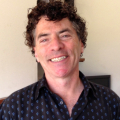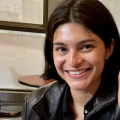Mindfulness
An exciting recent advance in the lab’s research agenda has been an examination of the impact of meditation and mindfulness techniques on attenuating mind-wandering. Conceptually speaking mind-wandering, which entails the mind’s drifting away from the here and now, can be conceived of as something akin to the opposite of mindfulness, in which the mind is focused on the present. A recent article by Mrazek, Smallwood, and Schooler (2012) demonstrated that individuals who show a penchant for mindfulness (as measured by a variety of pre-existing self report measures) are less inclined to mind-wander in the laboratory. Perhaps even more importantly this study further demonstrated that a simple technique for enhancing mindfulness (attending to the breath for 10 minutes) reduces the behavioral consequences of mind-wandering. We are also extremely encouraged by results of a recent meditation training study (Mrazek et al, 2013) in which undergraduates received either a two week meditation class or a two week nutrition class. Comparisons between performance on pre and post test measures of both mind-wandering and reading comprehension revealed a marked reduction in mind-wandering and improvement in reading performance for participants in the meditation training condition, but no change for participants in the nutrition condition. More recently, a similar study found that a multifaceted intensive six week mindfulness program led to marked reductions in stress as indexed by an assortment of measures including subjective, behavioral, neuroendocrine, neural, genomic, and third-party ratings of stress (Mrazek et al., 2021).
Related Questions
News
- The Common Creatives Talk Mind "Wondering" with Dr. Schooler
- Wondering about mindfulness, mind-wandering, and consciousness: Interview with Jonathan Schooler
- UCSB News Feature: Surviving the Era of Unlimited Distraction
- Is There a Perfect Time of Day to Meditate?
- Try This Now: This Mindfulness Trick Will Improve Your Memory
- Can Meditation Improve Your Health? Here's What to Know
- Mindful Education Initiative featured in Time Magazine
- Advancing Creativity with Cutting-Edge Research
- Is your attention span normal?
- Is Mindfulness Harmful?
- Breathing In vs Spacing Out
- How Meditation Might Boost Your Test Scores
- Mindfulness Could Improve College Students' Testing Ability, Study Finds
- Can ‘Mindfulness’ Really Help You Focus?
Selected Publications
- A relationship that makes life worth-living: levels of value orientation explain differences in meaning and life satisfaction.
- Teenagers’ Smartphone Use during Homework: An Analysis of Beliefs and Behaviors around Digital Multitasking
- Slaying the Hydra: Integrative Wellness Training Affects Ten Complementary Measures of Stress
- Planning to Practice: Action and Coping Plans Increase Days of Meditation Practiced
- Familiarity, Attitudes, and Self-Regulatory Challenges Related to Mindfulness
- Mindfulness-Based Attention Training: Feasibility and Preliminary Outcomes of a Digital Course for High School Students
- An integrated assessment of changes in brain structure and function of the insula resulting from an intensive mindfulness-based intervention
- The Future of Mindfulness Training is Digital, and the Future is Now
- Intentionality and meta-awareness of mind wandering: Are they one and the same, or distinct dimensions?
- Pushing the Limits: Cognitive, Affective, & Neural Plasticity Revealed by an Intensive Multifaceted Intervention
- Mind wandering “Ahas” versus mindful reasoning: alternative routes to creative solutions
- Unaware yet reliant on attention: Experience sampling reveals that mind-wandering impedes implicit learning
- The Middle Way: Finding the Balance between Mindfulness and Mind-Wandering
- Insights from Quiet Minds: The Converging Fields of Mindfulness and Mind-Wandering
- Mindfulness Training Improves Working Memory Capacity and GRE Performance While Reducing Mind Wandering.
- Mindfulness and mind-wandering: Finding convergence through opposing constructs
- Signal or noise: brain network interactions underlying the experience and training of mindfulness
- Mindfulness in education: Enhancing academic achievement and student well-being by reducing mind-wandering
- Language facilitates introspection: verbal mind-wandering has privileged access to consciousness
- Meditation training influences mind wandering and mindless reading.
- Mind-wandering and meta-awareness in hypnosis and meditation: Relating executive function across states of consciousness.







